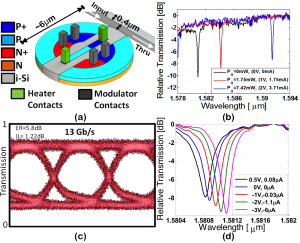Vertical Junction Silicon Microdisk Modulator with Integrated Thermal Tuner
- Category: Nanotechnology, Optics & Photonics
- Tags: erman timurdogan, michael watts
Silicon photonics, because it enables wavelength division multiplexed (WDM) systems, will help to minimize the number of fibers required in high performance computing (HPC) machines. It also promises to do so with low power and high-speed resonant devices. Resonant electro-optic modulators will likely be used to transmit data in the WDM links and have been demonstrated to have energies as low as 3fJ/bit at a data rate of 12.5Gb/s[1] and 13fJ/bit at a data rate of 25Gb/s[2]. However, resonance drifts, induced by process/wafer variations and dynamic temperature fluctuations, distort the alignment between the modulators and the desired WDM channels. Electro-optic tuning can be used for temperature variations of ~± 2.50C. However, processor core activity on chip yields temperature fluctuations on the order of ±100C. Therefore, thermo-optic control of the resonators is necessary[3]. The integration of heaters within microring filters and modulators achieves the best optimization of thermal tuning power (4.4 µW/GHz) and speed (1 µs)[4].
In our work[5], we propose a ~6-µm diameter (footprint ~ 28 µm2) microdisk modulator with a CMOS compatible integrated heater in the center that allows for high performance modulation and minimum thermal capacitance (Figure 1a). The hard outer walls of the microdisk modulator enable minimum bend radii and high-Q operation (Figure 1a-b). A vertical p-n junction near to the edge of the microdisk modulator and low resistance interior contacts enables high-speed modulation (Figure 1c). Frequency shifts and spectral response are shown in Figure 1d. The proposed microdisk modulator is measured to have a 4.9µW/GHz thermal tuning efficiency (Figure 1b) and ~11fJ/bit performance at a data rate of 13 Gb/s (Figure 1c), a 5.8dB extinction ratio, and a 1.22dB insertion loss. This is the most efficient heater integration into a modulator; the first modulator exhibits total modulation and heater energy <50fJ/bit for a realistic modulator performance.

Figure 1: a) 3D sketch of the microdisk modulator with integrated heater showing size, doping and contacts. b) Measured DC spectral response of the integrated heater inside the microdisk modulator with an applied bias voltage to heater pins. c) High-speed optical eye diagrams at a data rate of 13-Gb/s with an ac-coupled 1.5Vpp drive and 2V applied across heater contacts. The extinction ratio is 5.8dB and insertion loss is 1.22dB. d) Measured spectral response of the microdisk modulator with applied DC bias voltage to modulator pins from -3V to 0.5V.
- M. R. Watts, W. A. Zortman, D. C. Trotter, R. W. Young, and A. L. Lentine, “Vertical junction silicon microdisk modulators and switches,” Opt. Exp., vol. 19, no. 22, pp. 21989–22003 2011. [↩]
- E. Timurdogan, C. M. Sorace-Agaskar, A. Biberman, and M. R. Watts, “Vertical Junction Silicon Microdisk Modulators at 25Gb/s,” in Proc. OFC/NFOEC, paper OTh3H.2 2013. [↩]
- E. Timurdogan, A. Biberman, D. Trotter, C. Sun, M. Moresco, V. Stojanovic, and M. R. Watts, “Automated Wavelength Recovery for Microring Resonators,” in Proc. Conf. Lasers Electro-Opt., paper CM2M.1 2012. [↩]
- M. R. Watts , W. A. Zortman , D. C. Trotter , G. N. Nielson , D. L. Luck and R. W. Yong “Adiabatic resonant microrings (ARMs) with directly integrated thermal microphotonics”, in Proc. Conf. Lasers Electro-Opt., pp.1 -2 2009. [↩]
- E. Timurdogan, C. M. Sorace-Agaskar, E. S. Hosseini, G. Leake, D. D. Coolbaugh, and M. R. Watts, “Vertical Junction Silicon Microdisk Modulator with Integrated Thermal Tuner,” in Proc. Conf. Lasers Electro-Opt., paper CTu2F.2 2013. [↩]